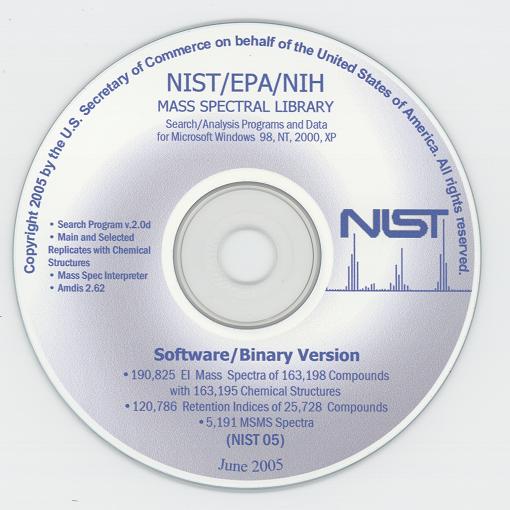
The newest version of the NIST/EPA/NIH Mass Spectral Library (NIST05), including NIST MS Search Software, is now available at a great low price. Ordered from GC Image, a current license with the NIST05 CD is $1295. Licensees of the NIST/EPA/NIH MS Library may upgrade from an earlier version for $895. Discounts are available for simultaneous purchase of multiple licenses.
Contact:|
GC Image, LLC
email: info@gcimage.com |
NIST05 contains major enhancements over NIST02:
- 190,825 EI mass spectra of 163,198 different chemical compounds --- approximately 20,000 additional EI spectra.
- Improved quality, e.g., consistency of naming and structure representation, resolution of chemical structure ambiguities arising from different forms of the same compound, linking of closely related compounds with similar spectra (stereoisomers), and hundreds of spectra measured on ion trap instruments.
- Gas phase retention index data and estimates. The data includes gas-phase retention indices on non-polar columns, with the Kovacs retention indices of 25,893 compounds. The estimated retention indices are provided for most compounds in the library, with recommended uncertainties, will allow removal of many false hits.
- 5,191 MS/MS spectra for of 1,943 different ions, most measured on ion trap and triple quadrupole instruments.
- Search Program v.2.0d and Amdis 2.62.
NIST Peptide Ion Framentation Spectra Library
(included at no cost)
Purchasers also may receive, at no additional cost, the NIST Library of
Peptide Ion Fragmentation Spectra, derived from thousands of LC-MS/MS
analyses from dozens of labs, including NIST. These spectra are
intended for identification and verification of protonated peptides.
The library contains tryptic peptides from digests of human, yeast, two
bacterial (D. Radiodurans and M. Smegmatis) and nineteen selected
proteins. It is composed of 'Consensus spectra' synthesized from
multiple spectra identifying a peptide ion, along with the best quality
individual spectrum for each peptide ion. Both ion trap and qtof
spectra are included along with tested algorithms for identification
and instrument-independent searching. Tests of this library by NIST
and others demonstrate that major improvements in protein and biomarker
identification can result from use of a reference MS/MS library in a
proteomics 'pipeline'.